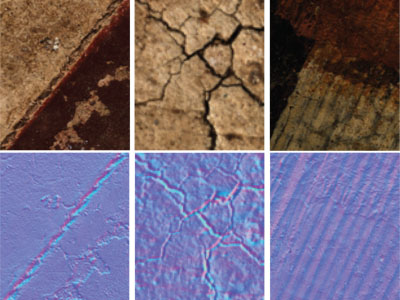Multi-Feature Matching of Fresco Fragments
ACM Transactions on Graphics (Proc. SIGGRAPH Asia), December 2010

Abstract
We present a multiple-feature approach for determining matches
between small fragments of archaeological artifacts such as
Bronze-Age and Roman frescoes. In contrast with traditional 2D
and 3D shape matching approaches, we introduce a set of feature
descriptors that are based on not only color and shape, but also
normal maps. These are easy to acquire and combine high data
quality with discriminability and robustness to some types of
deterioration. Our feature descriptors range from general-purpose
to domain-specific, and are quick to compute and match. We
have tested our system on three datasets of fresco fragments,
demonstrating that multi-cue matching using different subsets
of features leads to different tradeoffs between efficiency and
effectiveness. In particular, we show that normal-based features
are more effective than color-based ones at similar computational
complexity, and that 3D features are more discriminative than ones
based on 2D or normals, but at higher computational cost. We
also demonstrate how machine learning techniques can be used to
effectively combine our new features with traditional ones. Our
results show good retrieval performance, significantly improving
upon the match prediction rate of state-of-the-art 3D matching
algorithms, and are expected to extend to general matching
problems in applications such as texture synthesis and forensics.
Paper
Citation
Corey Toler-Franklin, Benedict Brown, Tim Weyrich, Thomas Funkhouser, and Szymon Rusinkiewicz.
"Multi-Feature Matching of Fresco Fragments."
ACM Transactions on Graphics (Proc. SIGGRAPH Asia) 29(6), December 2010.
BibTeX
@article{Toler-Franklin:2010:MMO,
author = "Corey Toler-Franklin and Benedict Brown and Tim Weyrich and Thomas
Funkhouser and Szymon Rusinkiewicz",
title = "Multi-Feature Matching of Fresco Fragments",
journal = "ACM Transactions on Graphics (Proc. SIGGRAPH Asia)",
year = "2010",
month = dec,
volume = "29",
number = "6"
}